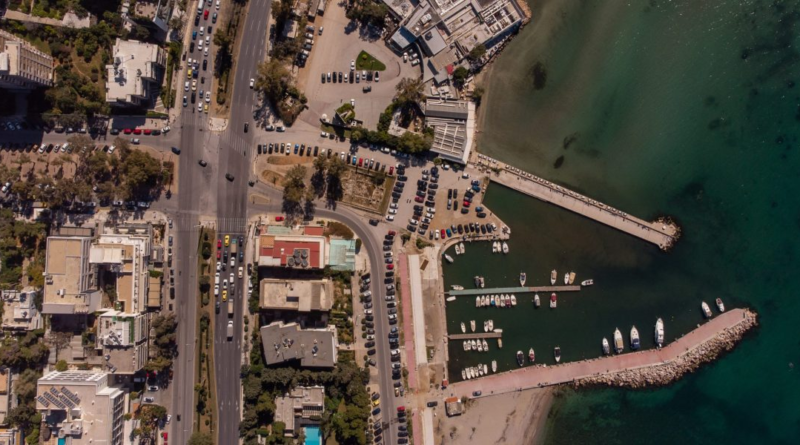Europe’s largest smart city arises from the ashes of Greece’s debt crisis
On the southern coastline of Greece’s capital, a long-awaited plan to transform the city’s former airport into the largest smart city in Europe is finally gaining momentum.
After a decade of delays, a vision of the Ellinikon is emerging. The Marina Tower, soon to be Greece’s first skyscraper, is beginning to rise. Iron skeletons of condos are taking form. Standing on the marina, with a view of the Saronic Gulf on one side and the tower on the other, it’s possible to imagine the future city, which will feature the open spaces, sustainable energy sources and abundant green spaces that Athens currently lacks.
“There was justifiable disbelief” in the project’s early days, Odisseas Athanasiou said in an interview. Athanasiou is the chief executive officer of Lamda, the developer behind the multiuse development.
Spread across 6,200 acres a 20-minute drive outside of Athens, Ellinikon will transform both the coastline and the country. It’s the kind of project normally seen in China or the United Arab Emirates, and a sign of Greece’s post-crisis revival and subsequent investor enthusiasm. Developers project that it will add 2.5 percentage points to Greece’s GDP, create as many as 80,000 new jobs and generate tax revenue of more than €10 billion following its completion in 2037. It’s also expected to draw an extra one million tourists a year, who will be able to choose between a Mandarin Oriental hotel and an integrated casino-resort for their lodgings.
Greece’s tourism sector has rebounded since the Covid-era, with 32 million visitors last year and 2024 on track to see a record number of arrivals.
For those who want to stay permanently, 243 units have already been put up for sale, and 140 have been reserved. The Marina Tower apartments, beachfront villas and condos sold out first, and Lamda announced earlier this month that proceeds from property sales have totalled €641 million as of last March. The majority of buyers have been Greek nationals, and the city is expected to house as many as 20,000 people in about 10,000 residencies within the next 13 years.
Working off the urban planning concept of the 15-minute city, Ellinikon residents will be able to access schools, parks, offices, stores and even the beach in less than a quarter of an hour. Software to oversee waste, water, and energy services will be laced throughout the complex. “It’s a smart city end-to-end,” Athanasiou said, adding, “we like to call it ‘Zip Code Paradise.’”
The process of getting Ellinikon off the ground hasn’t been smooth. When Lamda purchased the plot of land in 2014, parts of it were littered with the ruins of the former airport – including abandoned aircraft – while other parts housed refugees and undocumented migrants. The beachfront was scattered with nightlife set-ups and long-forgotten sports facilities. Delays in the permitting process dragged things out further, and the fact that Greece was effectively bankrupt when the project was proposed made it seem even more unlikely it would ever get off the ground.
“We had a construction sector in Greece which was at its lowest point in ten years, due to the crisis,” Athanasiou explained. “People had left the country, and construction companies weren’t as strong as they used to be. Increased construction costs due to the energy crisis after the incident in Ukraine added to this situation.”
While those challenges have subsided, Lamda was — and is — still dealing with a labor shortage. Around 7,000 workers will be needed when construction gets underway next year around building the Ellinikon mall. Lamda has about 2,000 workers at the moment, and is in advanced talks with contractors about importing construction workers from other countries.




